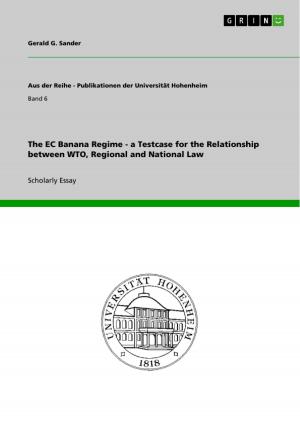The development of the Australian accounting standards after the end of the G4+1
Business & Finance, Accounting| Author: | Stefan Greite | ISBN: | 9783638332774 |
| Publisher: | GRIN Publishing | Publication: | December 17, 2004 |
| Imprint: | GRIN Publishing | Language: | English |
| Author: | Stefan Greite |
| ISBN: | 9783638332774 |
| Publisher: | GRIN Publishing |
| Publication: | December 17, 2004 |
| Imprint: | GRIN Publishing |
| Language: | English |
Seminar paper from the year 2003 in the subject Business economics - Accounting and Taxes, grade: 2,0 (B), Helmut Schmidt University - University of the Federal Armed Forces Hamburg (Institute for Corporate Accounting), course: Controlling, 27 entries in the bibliography, language: English, abstract: The topic of the paper is the 'The development of the accounting standards of the Australian Accounting Standard Board after the end of the G4+1.' I want to summarise the recent standardisation progress both international and in the view of Australia, and have a closer look on the Australian accounting environment. What was the G4+1, and why did it disband? What was the Australian reaction on the End of the G4+1. What will the future of international and Australian accounting look like? I have chosen the topic because I am currently staying at the Australian Defence Force Academy and studying at the University of New South Wales. Australia has been one of the major standard setters in the world and has had a deal of influence on international accounting standards, although it is a relatively small economy in the world. Hardly a day passes without problems of financial reporting appearing in the international press. Recent events like the scandals of Enron, Worldcom, and Xerox show the need for reasonable accounting. International accounting is an actual problem to be solved and a future chance for all kinds of businesses. After the introduction I will first present the accounting environment of Australia and its institutions. Then I will discuss the development of international accounting and the G4+1 group and its dissolution. I will have a look on the 'Harmonisation Project' and what happens in Australia after the end of the G4+1. At the end I will illustrate the relation between IAS and AAS, and give a conclusion. For my work I used several recent books on Australian financial accounting that are used by institutions across Australia, various Journals on accounting, government reports, and especially Publications of the standard setting bodies.
Seminar paper from the year 2003 in the subject Business economics - Accounting and Taxes, grade: 2,0 (B), Helmut Schmidt University - University of the Federal Armed Forces Hamburg (Institute for Corporate Accounting), course: Controlling, 27 entries in the bibliography, language: English, abstract: The topic of the paper is the 'The development of the accounting standards of the Australian Accounting Standard Board after the end of the G4+1.' I want to summarise the recent standardisation progress both international and in the view of Australia, and have a closer look on the Australian accounting environment. What was the G4+1, and why did it disband? What was the Australian reaction on the End of the G4+1. What will the future of international and Australian accounting look like? I have chosen the topic because I am currently staying at the Australian Defence Force Academy and studying at the University of New South Wales. Australia has been one of the major standard setters in the world and has had a deal of influence on international accounting standards, although it is a relatively small economy in the world. Hardly a day passes without problems of financial reporting appearing in the international press. Recent events like the scandals of Enron, Worldcom, and Xerox show the need for reasonable accounting. International accounting is an actual problem to be solved and a future chance for all kinds of businesses. After the introduction I will first present the accounting environment of Australia and its institutions. Then I will discuss the development of international accounting and the G4+1 group and its dissolution. I will have a look on the 'Harmonisation Project' and what happens in Australia after the end of the G4+1. At the end I will illustrate the relation between IAS and AAS, and give a conclusion. For my work I used several recent books on Australian financial accounting that are used by institutions across Australia, various Journals on accounting, government reports, and especially Publications of the standard setting bodies.















